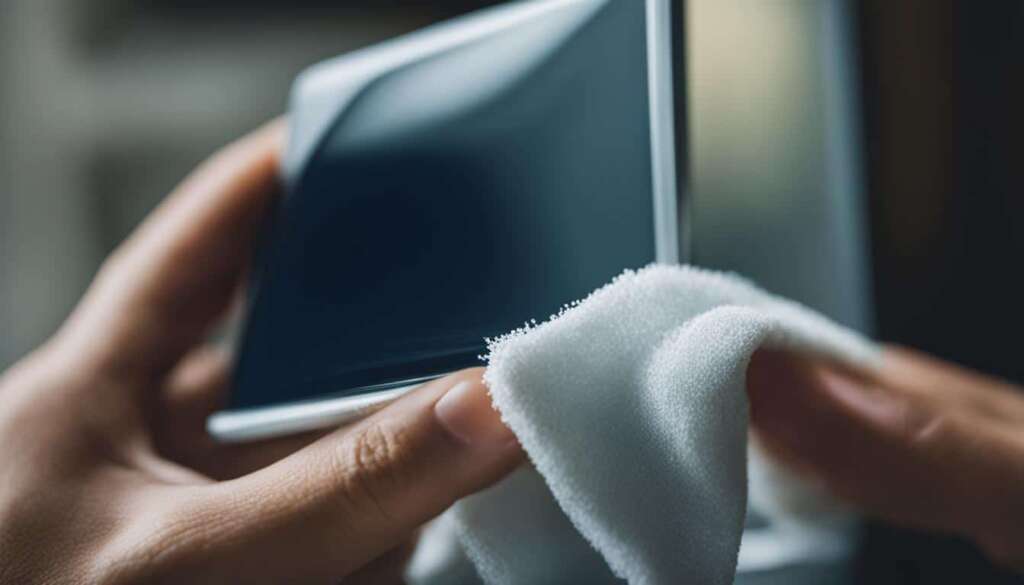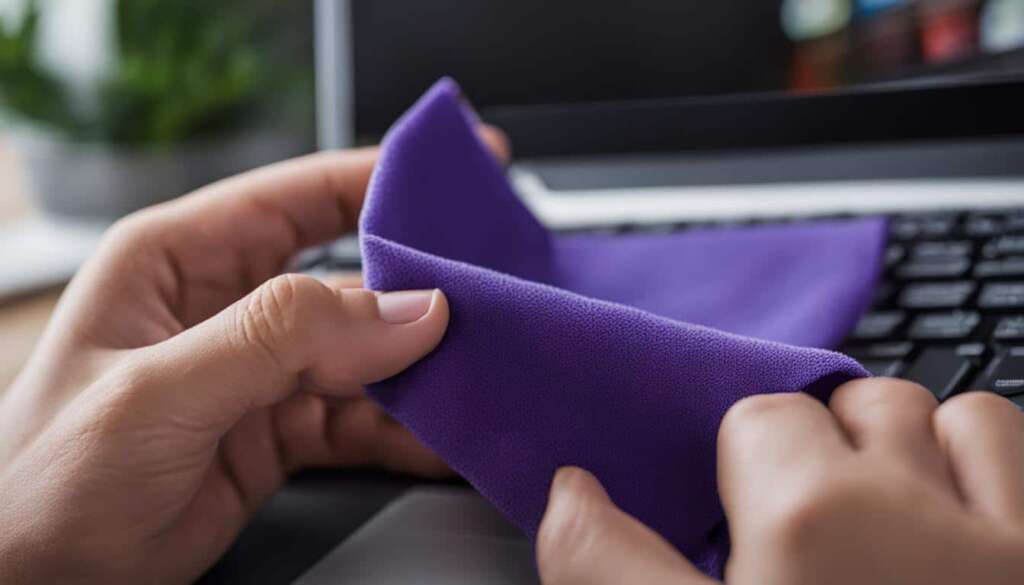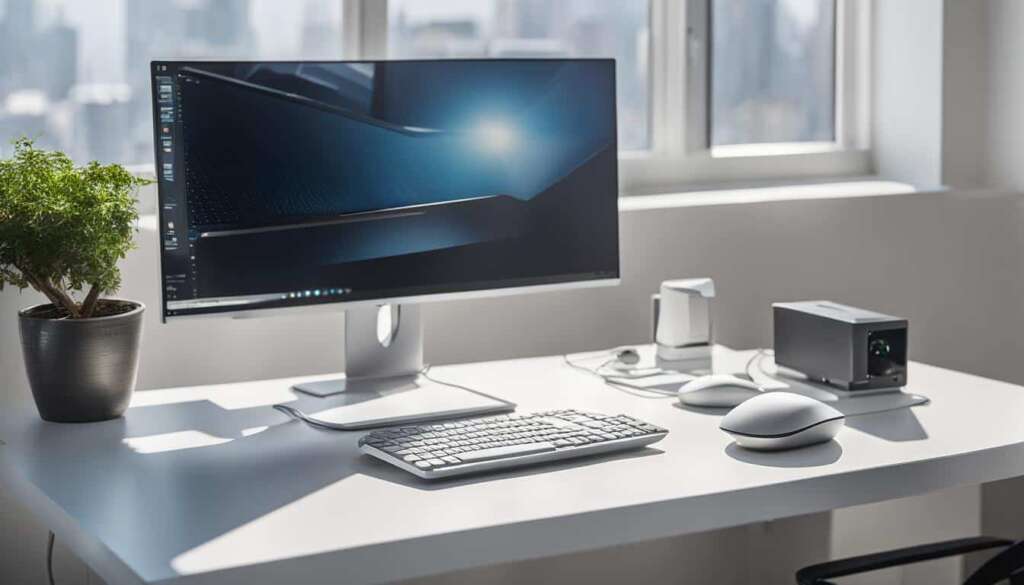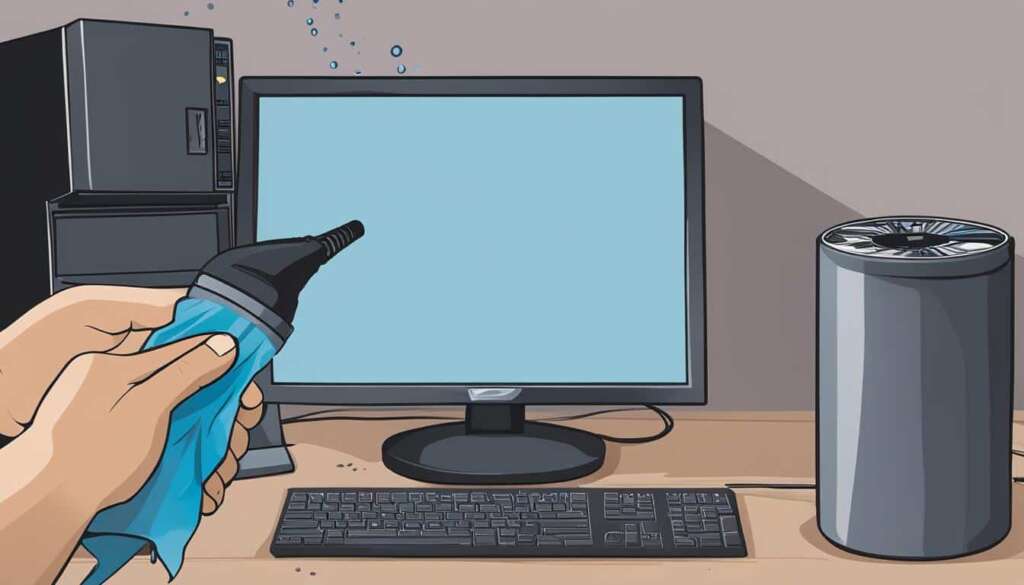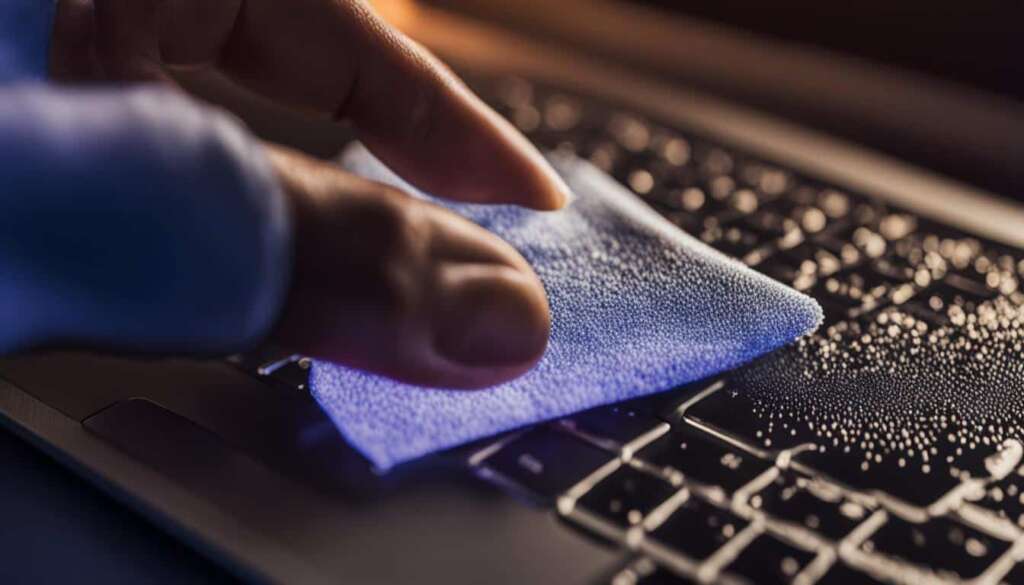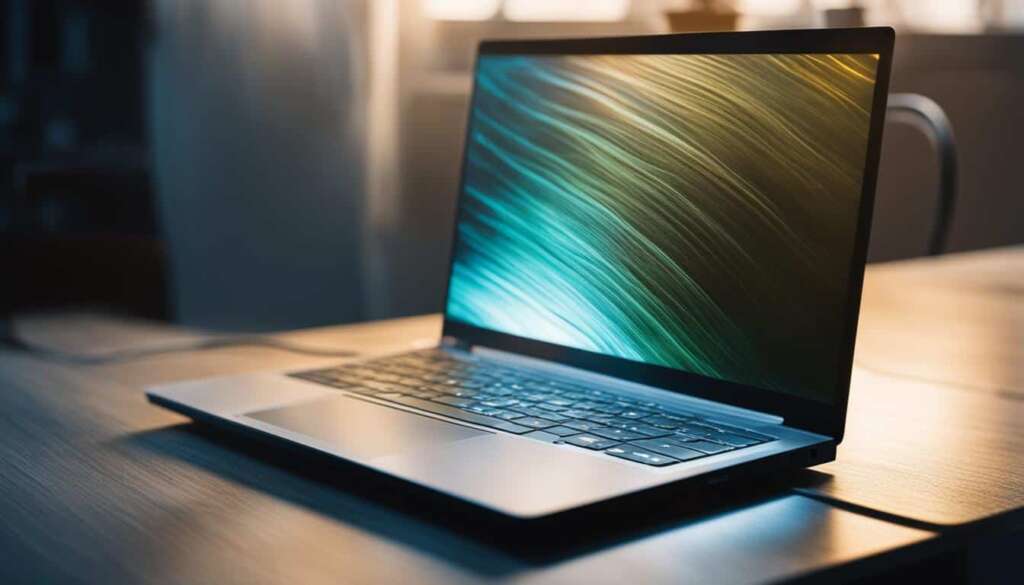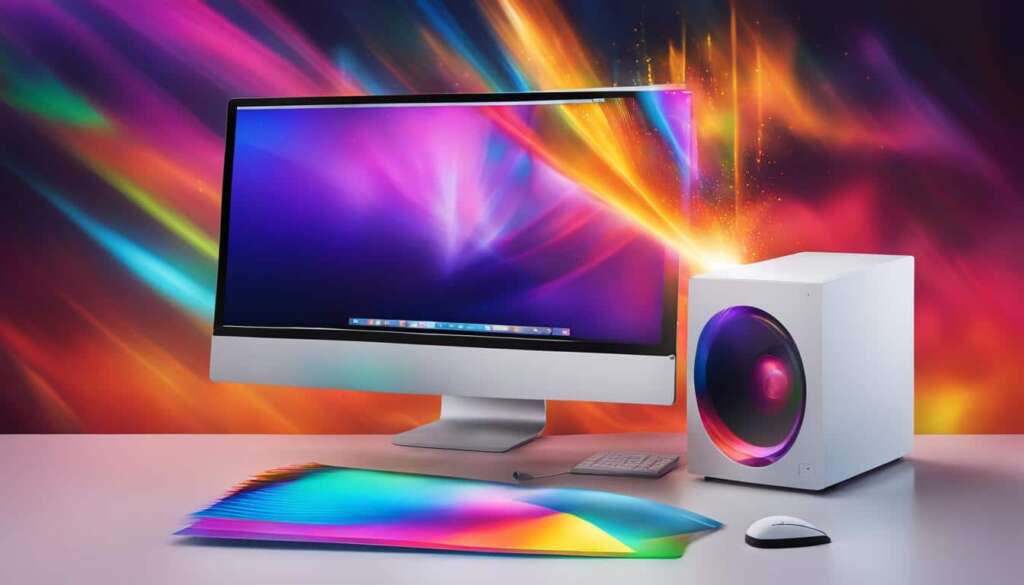Table of Contents
Keeping your computer screen clean is essential for optimal viewing and to maintain its longevity. Dust, smudges, and dirt can accumulate on the screen, affecting its clarity. However, cleaning a computer screen requires caution and the right techniques to prevent damage. In this guide, we will provide step-by-step instructions on how to clean different types of computer screens effectively.
Key Takeaways
- Wipe your computer screen using a microfiber cloth moistened with water for the safest cleaning method.
- Avoid spraying cleaning solutions directly onto the screen to prevent liquid damage.
- Glass-coated screens can be cleaned with mild solutions like rubbing alcohol, while LCD or LED screens should be cleaned with water only.
- Always turn off your computer before cleaning the screen to avoid electrical mishaps.
- Use soft microfiber cloths, avoid abrasive cleaning solutions, and never spray cleaning solution directly onto the screen.
Tips for Cleaning Glass-Coated Screens
Glass-coated screens, such as those on newer iMac displays and MacBooks, are sturdier and can tolerate mild cleaning solutions. To clean a glass-coated screen, you can use a mixture of equal parts water and vinegar or rubbing alcohol. Spray or lightly dab the solution onto a microfiber cloth and wipe the screen from left to right. Buff any remaining streaks with a dry cloth and allow the screen to dry completely before turning on the computer. Avoid using abrasive cleaning solutions, and never spray cleaning solution directly onto the screen.
Benefits of Cleaning Glass-Coated Screens:
- Safe and effective for removing fingerprints and smudges
- Preserves the clarity and visual quality of the screen
- Helps prevent buildup of dirt and dust particles
“Cleaning glass-coated screens with a mild solution is an effective way to maintain the cleanliness and longevity of your computer display.”
By following these tips, you can ensure that your glass-coated screen remains clean and free from smudges, enhancing your viewing experience. Regular cleaning with safe methods will help preserve the quality of your computer screen for years to come.
| Safe Cleaning Methods for Glass-Coated Screens | Avoid |
|---|---|
| Using a mixture of equal parts water and vinegar or rubbing alcohol | Using abrasive cleaning solutions |
| Lightly dabbing or spraying the cleaning solution onto a microfiber cloth | Spraying cleaning solution directly onto the screen |
| Wiping the screen from left to right to remove streaks | Using excessive force or scrubbing the screen |
Steps for Cleaning LCD or LED Screens
When it comes to cleaning LCD or LED screens, it’s important to follow the right techniques to avoid damaging your device. These screens, commonly found on Windows computers, touchscreens, and matte displays, require more caution during the cleaning process. Here are the effective computer screen cleaning techniques to keep your LCD or LED screen looking its best:
- Turn off the computer: Before cleaning the screen, make sure to turn off your computer and let it cool down to prevent any electrical mishaps.
- Use a dry, lint-free microfiber cloth: Gently wipe away dust and dirt from the screen using a dry microfiber cloth. Be sure to avoid applying excessive pressure, as it can damage the screen.
- Moisten the cloth with distilled water if needed: If there are stubborn smudges or marks on the screen, lightly moisten the cloth with distilled water. Avoid using tap water, as it may contain minerals that can leave streaks on the screen.
- Wipe the screen in a gentle, circular motion: Using the dampened cloth, wipe the screen in a gentle, circular motion. This will help to remove any remaining dirt or smudges without causing damage.
- Avoid spraying cleaning solution directly on the screen: It’s important to note that you should never spray any cleaning solution directly onto the screen. This can cause liquid to seep into the device and damage the internal components.
- Buff away any streaks with a dry microfiber cloth: After cleaning, use a dry microfiber cloth to buff away any streaks on the screen. This will leave your LCD or LED screen looking clean and clear.
- Allow the screen to air dry completely: Finally, make sure to allow the screen to air dry completely before turning on your computer again. This will ensure that no moisture is left on the screen.
By following these best way to clean computer screen techniques, you can effectively remove dirt, dust, and smudges from your LCD or LED screen without causing any damage. Remember to always be gentle and avoid using abrasive cleaners or spraying cleaning solution directly onto the screen. Taking care of your computer screen will help to maintain its longevity and ensure optimal viewing.
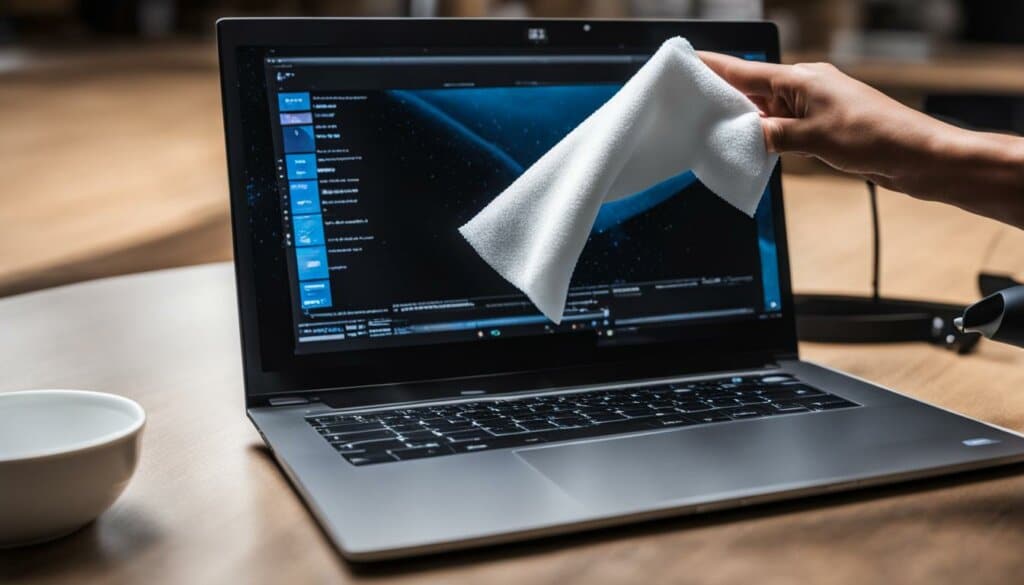
Tips for Cleaning All Types of Computer Screens
When it comes to cleaning your computer screen, there are some general tips that apply to all types of screens. By following these guidelines, you can ensure effective cleaning and maintain the longevity of your screen.
Use the Right Materials
It’s important to use the right materials when cleaning your computer screen. Soft microfiber cloths are ideal for removing dust, smudges, and dirt without scratching the screen. Avoid using fabrics like cotton, as they can leave behind lint or cause scratches. Additionally, never use abrasive cleaning solutions or materials, as they can damage the screen.
Turn Off the Computer
Before cleaning your computer screen, always remember to turn off the computer. This not only prevents any electrical mishaps but also allows you to see the dirt and smudges more clearly. Cleaning the screen while it’s turned off also reduces the risk of accidentally pressing buttons or opening applications.
Proper Cleaning Techniques
When cleaning your computer screen, it’s important to use gentle, circular motions to remove dust and smudges. Avoid applying too much pressure or scrubbing vigorously, as this can damage the internal components of the screen. Instead, use light pressure and let the cloth do the work. Wipe the screen in tight, Z-shaped motions or broad strokes from side to side to avoid streaking.
| Type of Screen | Cleaning Method |
|---|---|
| Glass-coated screens | Mix equal parts water and vinegar or rubbing alcohol. Lightly dab the solution onto a microfiber cloth and wipe the screen from left to right. Buff any remaining streaks with a dry cloth. |
| LCD or LED screens | Use a dry, lint-free microfiber cloth to gently wipe away dust and dirt. If necessary, lightly moisten the cloth with distilled water and wipe the screen in a gentle, circular motion. Use a dry microfiber cloth to buff away any streaks. |
By following these general tips and specific cleaning methods for each screen type, you can keep your computer screen clean and clear for optimal viewing. Remember to be cautious, use the right materials, and avoid harsh cleaning solutions to ensure the longevity of your screen.
Conclusion
Cleaning your computer screen effectively is essential to maintain its longevity and ensure a clear display. By following the appropriate techniques for your specific screen type, using the correct materials, and exercising caution throughout the cleaning process, you can effortlessly eliminate dust, smudges, and dirt from your computer screen.
Remember to always turn off your computer before cleaning the screen to avoid any potential electrical mishaps. Avoid using abrasive cleaning solutions, such as bleach or scouring powder, as they can cause damage to the screen. Instead, opt for filtered or distilled water to prevent streaks caused by minerals present in tap water. Soft microfiber cloths are ideal for cleaning, as they won’t scratch the screen. It’s important to mist the cleaning solution onto the cloth rather than directly onto the screen. When wiping the screen, employ gentle circular motions or broad strokes from side to side to ensure even pressure and avoid streaking. Lastly, refrain from applying excessive pressure or scrubbing too hard, as this can harm the internal components of the screen.
Regularly cleaning your computer screen using these techniques will result in an optimal viewing experience with a clean and clear display. By incorporating these best practices into your cleaning routine, you can enjoy a well-maintained computer screen that enhances your productivity and overall enjoyment of your digital devices.
FAQ
What is the safest way to clean a computer screen?
The safest way to clean a computer screen is to wipe it with a damp microfiber cloth.
Can I spray cleaning solution directly onto the screen?
No, you should avoid spraying cleaning solution directly onto the screen to prevent liquid from dripping inside the device and causing damage.
Can I use rubbing alcohol to clean my computer screen?
Rubbing alcohol can be used to clean glass-coated screens, but not LCD or LED screens.
How should I clean a glass-coated screen?
To clean a glass-coated screen, you can use a mixture of equal parts water and vinegar or rubbing alcohol. Spray or lightly dab the solution onto a microfiber cloth and wipe the screen from left to right.
How should I clean an LCD or LED screen?
To clean an LCD or LED screen, use a dry, lint-free microfiber cloth to gently wipe away dust and dirt. If necessary, lightly moisten the cloth with distilled water and wipe the screen in a gentle, circular motion.
Should I turn off the computer before cleaning the screen?
Yes, it’s important to turn off the computer before cleaning the screen to prevent any electrical mishaps.
What cleaning solutions should I avoid?
You should avoid using abrasive cleaning solutions, such as bleach or scouring powder, as they can damage the screen.
Can I use tap water to clean my computer screen?
It’s recommended to use filtered or distilled water to prevent streaks caused by minerals in tap water.
What type of cloth should I use for cleaning?
It’s important to use soft microfiber cloths for cleaning, as even fabrics like cotton can scratch the screen.
Can I spray cleaning solution directly onto the screen?
No, you should never spray cleaning solution directly onto the screen. Instead, mist it onto the cloth.
How should I wipe the screen?
Wipe the screen in tight, Z-shaped motions or broad strokes from side to side to avoid uneven pressure and streaking.
Can I apply hard pressure when cleaning?
No, apply gentle pressure and avoid hard scrubbing, as it can damage the internal components of the screen.

